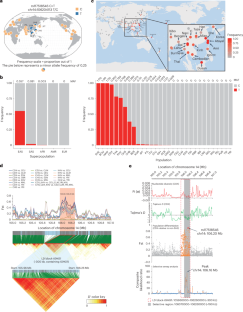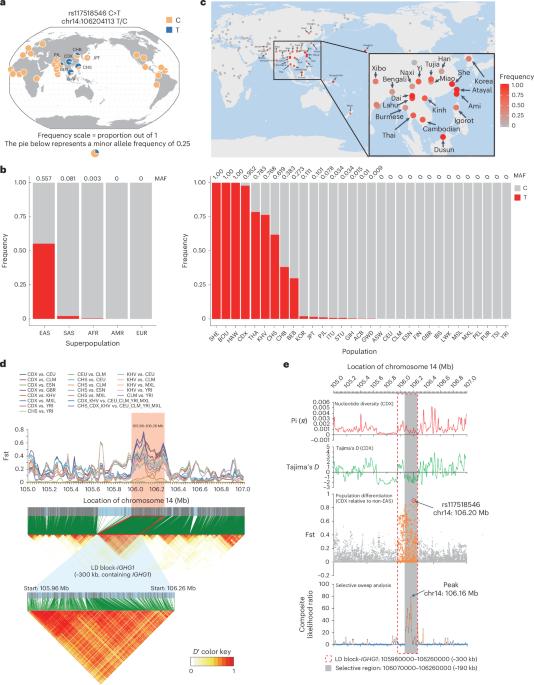An IGHG1 variant exhibits polarized prevalence and confers enhanced IgG1 antibody responses against life-threatening organisms
IF 27.7
1区 医学
Q1 IMMUNOLOGY
引用次数: 0
Abstract
Evolutionary pressures sculpt population genetics, whereas immune adaptation fortifies humans against life-threatening organisms. How the evolution of selective genetic variation in adaptive immune receptors orchestrates the adaptation of human populations to contextual perturbations remains elusive. Here, we show that the G396R coding variant within the human immunoglobulin G1 (IgG1) heavy chain presents a concentrated prevalence in Southeast Asian populations. We uncovered a 190-kb genomic linkage disequilibrium block peaked in close proximity to this variant, suggestive of potential Darwinian selection. This variant confers heightened immune resilience against various pathogens and viper toxins in mice. Mechanistic studies involving severe acute respiratory syndrome coronavirus 2 infection and vaccinated individuals reveal that this variant enhances pathogen-specific IgG1+ memory B cell activation and antibody production. This G396R variant may have arisen on a Neanderthal haplotype background. These findings underscore the importance of an IGHG1 variant in reinforcing IgG1 antibody responses against life-threatening organisms, unraveling the intricate interplay between human evolution and immune adaptation. Liu and colleagues show that a previously described G396R variant of the human IGHG1 gene offers increased protection from SARS-CoV-2 and bacterial infections.


一种 IGHG1 变体表现出极化流行,并能增强针对危及生命的生物体的 IgG1 抗体反应
进化压力雕琢着种群遗传学,而免疫适应则强化人类抵御威胁生命的生物。适应性免疫受体的选择性遗传变异是如何协调人类种群对环境干扰的适应性进化的,至今仍是一个谜。在这里,我们发现人类免疫球蛋白 G1(IgG1)重链中的 G396R 编码变异在东南亚人群中集中流行。我们发现了一个 190-kb 的基因组连锁不平衡块,其峰值与该变异体非常接近,这表明存在潜在的达尔文选择。该变体能增强小鼠对各种病原体和毒蛇毒素的免疫恢复能力。对严重急性呼吸系统综合征冠状病毒 2 感染和接种疫苗的个体进行的机理研究显示,该变体能增强病原体特异性 IgG1+ 记忆 B 细胞的活化和抗体产生。这种 G396R 变异可能产生于尼安德特人单倍型背景。这些发现强调了IGHG1变体在加强针对威胁生命的生物体的IgG1抗体反应中的重要性,揭示了人类进化与免疫适应之间错综复杂的相互作用。
本文章由计算机程序翻译,如有差异,请以英文原文为准。
求助全文
约1分钟内获得全文
求助全文
来源期刊

Nature Immunology
医学-免疫学
CiteScore
40.00
自引率
2.30%
发文量
248
审稿时长
4-8 weeks
期刊介绍:
Nature Immunology is a monthly journal that publishes the highest quality research in all areas of immunology. The editorial decisions are made by a team of full-time professional editors. The journal prioritizes work that provides translational and/or fundamental insight into the workings of the immune system. It covers a wide range of topics including innate immunity and inflammation, development, immune receptors, signaling and apoptosis, antigen presentation, gene regulation and recombination, cellular and systemic immunity, vaccines, immune tolerance, autoimmunity, tumor immunology, and microbial immunopathology. In addition to publishing significant original research, Nature Immunology also includes comments, News and Views, research highlights, matters arising from readers, and reviews of the literature. The journal serves as a major conduit of top-quality information for the immunology community.
 求助内容:
求助内容: 应助结果提醒方式:
应助结果提醒方式:


